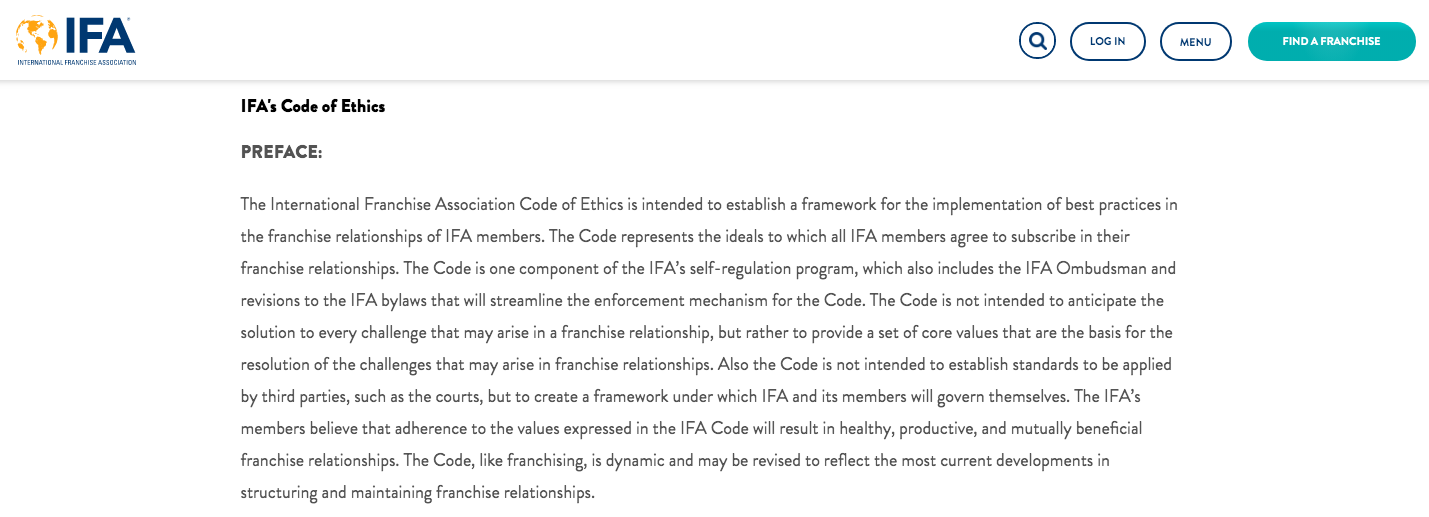Self-Regulation won’t work in the franchise industry until power is equally balanced between franchiSEES and franchiSORS. Right now, franchise agreements are weighted excessively in franchiSORS’ favor giving franchiSORS too much power to harm franchiSEES.
The IFA Code of Ethics ignores this major power imbalance and promotes the idea that getting into franchising is like getting into a love-fest.
False.
Franchising is not a love-fest. Franchising is more like a war. Conflict between franchiSEES and franchiSORS is at the heart of the current franchise crisis.
The IFA Code of Ethics preface reads (emphasis added):
“The International Franchise Association Code of Ethics is intended to establish a framework for the implementation of best practices in the franchise relationships of IFA members. The Code represents the ideals to which all IFA members agree to subscribe in their franchise relationships. The Code is one component of the IFA’s self-regulation program, which also includes the IFA Ombudsman and revisions to the IFA bylaws that will streamline the enforcement mechanism for the Code.”
The IFA wants franchiSEES and franchiSORS to each willingly subscribe to “best practices” while allowing franchiSORS to maintain a preponderance of the power. This doesn’t work in the real world. In the real world, relationships between parties that have equal power are relationships that are candidates for self-regulation and the willing use of “best practices.”
But the IFA doesn’t want to equalize power between franchiSORS and franchiSEES. It wants to maintain the status quo. It wants the franchiSORS (the money-makers) to keep the power and the franchiSEES (the investors) to remain powerless. As evidence, the IFA is currently lobbying against legislation that would protect the franchiSEE and the taxpayer. And in the past, the IFA has lobbied against legislation that would enforce “best practices” in franchise relationships.
The IFA’s commitment to “self-regulation” is further emphasized in the preface to their Code of Ethics. It goes on to read (emphasis added):
“Also the Code is not intended to establish standards to be applied by third parties, such as the courts, but to create a framework under which IFA and its members will govern themselves.”
The problem is that the FranchiSORS are using the unjust contracts heavily weighted in frachiSORS’ favor. The problem is that franchiSORS’ are aggressively using the courts to enforce those contracts and take franchiSEES life savings and homes. The problem is that franchiSORS are using franchiSEE and taxpayer-backed SBA loans (without even disclosing revenue to franchiSEES prior to loan docs being signed) to expand the franchiSORS businesses.
The IFA’s love-fest isn’t working.
And the IFA, franchiSORS, franchise consultants, companies that issue franchise “awards,” and even companies that gather data to help franchiSEES find the “good franchiSORS” all make money when franchises are sold.
FranchiSORS expand their businesses without any risk. All of the risk falls on the taxpayer, the franchiSEE and the economy.
The franchiSORS don’t want to lose this advantage, so they argue for a “self-regulation” love-fest and continue in their harmful and malicious fraud.
The IFA Code of Ethics goes on to read (emphasis added):
“Every franchise relationship is founded on the mutual commitment of both parties to fulfill their obligations under the franchise agreement. Each party will fulfill its obligations, will act consistently with the interests of the brand, and will not act so as to harm the brand and system. This willing interdependence between franchisors and franchisees, and the trust and honesty upon which it is founded, has made franchising a worldwide success as a strategy for business growth.”
The problem with the IFA’s idea is that the franchise agreement is written by the franchiSOR and greatly in the franchiSORS’ favor. No, Exponentially in the franchiSORS’ favor. FranchiSEES are required to initial ALL CAPS statements that revoke their rights, sign personal guarantees, and agree to “integration clauses,” “liquidated damages clauses,” and the payment of future royalties even when their businesses don’t succeed!
If the IFA wants to use self-regulation and honorable adherence to agreements to make “franchising a worldwide success strategy for business growth,” then the IFA needs to support the use of fair contracts. Instead, however, the IFA lobbies against legislation that would ensure equity.
And, if the IFA is in support of adherence to legal agreements, then the IFA is in support of franchiSORS using the legal agreements imbalanced highly in the franchiSORS’ favor to police their franchiSEES using the court system. When the franchiSORS use their legal agreements in the courts, they are very literally very often able to aggressively take everything franchiSEES own and use it to expand their own businesses.
The IFA Code of Ethics goes on to read (emphasis added):
“Honesty embodies openness, candor, and truthfulness. Franchisees and franchisors commit to sharing ideas and information and to facing challenges in clear and direct terms. IFA members will be sincere in word, act, and character — reputable and without deception.
These collaborative ideals are beautiful. In the real world, open, honest and egalitarian collaboration occurs when there is a balance of pawer between parties. Contracts weighted highly in the favor of franchiSORS designed to make it possible for franchiSORS to take everything frnchiSEES own should franchiSEES’ investments (in franchiSORS’ businesses, mind you) fail are not contracts that balance power.
The ideals the IFA promotes won’t work until there is equality in power between franchiSEES and franchiSORS. But the IFA doesn’t want that equality. It lobbies against equality in favor of self-regulation, honesty, trust and truth.
The IFA Code of Ethics goes on to read (emphasis added):
“The public image and reputation of the franchise system is one of its most valuable and enduring assets. A positive image and reputation will create value for franchisors and franchisees, attract investment in existing and new outlets from franchisees and from new franchise operators, help capture additional market share, and enhance consumer loyalty and satisfaction. This can only be achieved with trust, truth, and honesty between franchisors and franchisees.”
Here, the IFA is appealing to franchiSORS’ reason. If franchiSORS don’t use their extreme power advantage against franchiSEES and willingly choose to treat them respectfully and ethically, franchiSORS will benefit because their “image and reputation” will remain a “strong and enduring” asset.
But in a “red” organization, franchiSEES are afraid. In a red organization, franchiSORS intentionally use fear to maintain compliance. In a red organization, franchiSEES may only be pretending that “trust, truth and honesty” exist between themselves and their franchiSORS. In a red organization, franchiSEES have every right to be afraid of what will happen to them if they do not express loyalty.
For most, money speaks more loudly than reason.
WHY FRANCHISEES ARE SILENT:
In its “Open and Frequent Communication” section, the IFA Code of Ethics goes on to read (emphasis added):
“IFA’s members believe that franchising is a unique form of business relationship. Nowhere else in the world does there exist a business relationship that embodies such a significant degree of mutual interdependence. IFA members believe that to be successful, this unique relationship requires continual and effective communication between franchisees and franchisors.
IFA’s members recognize that misunderstanding and loss of trust and consensus on the direction of a franchise system can develop when franchisors and franchisees fail to communicate effectively. Effective communication requires openness, candor, and trust and is an integral component of a successful franchise system. Effective communication is an essential predicate for consensus and collaboration, the resolution of differences, progress, and innovation.
To foster franchising as a unique and enormously successful relationship, IFA’s members commit to establishing and maintaining programs that promote effective communication within franchise systems. These programs should be widely publicized within systems, available to all members of the franchise system, and should facilitate frequent dialogue within franchise systems. IFA members are encouraged to also utilize the IFA Ombudsman to assist in enhancing communication and collaboration about issues affecting the franchise system.
The major power differences in red organizations prevent the less powerful parties from having an equal voice at the table. Without power equality, there will never be effective, open and honest communication between franchiSEES and franchiSORS. Power equality will occur when the contracts are fair, when the laws don’t favor the franchiSORS, and when the franchiSEES are making money in franchising, too.



